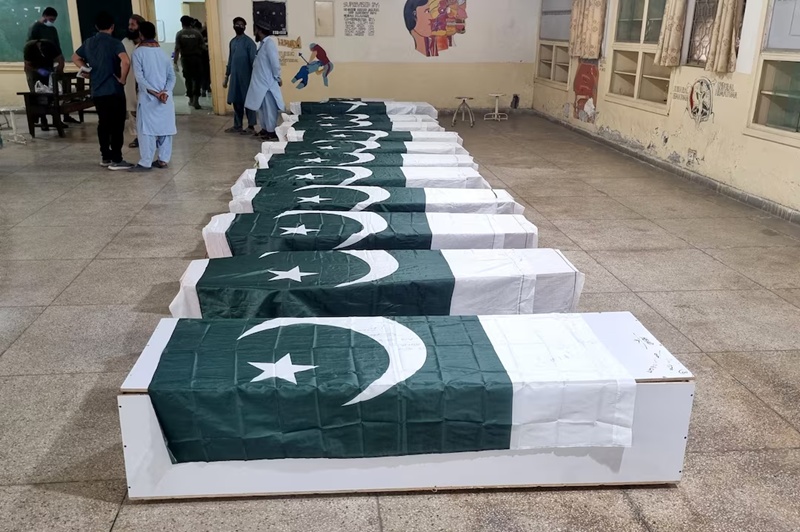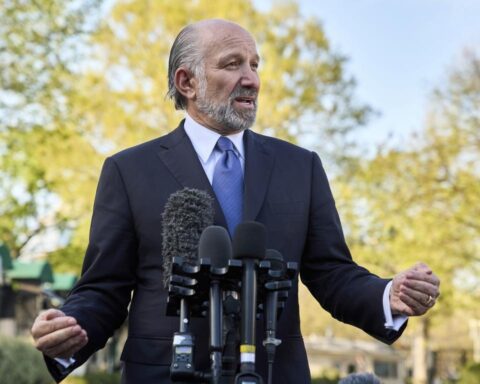MURIDKE, Pakistan, May 8 (Reuters) – Video footage from the early hours of Wednesday shows a bright flash from the residential Islamic seminary outside Bahawalpur in central Pakistan as India attacked its neighbour in response to the killing of Indian tourists in Kashmir.
The seminary was emptied of its students in recent days as speculation grew that would be targeted by India, but the family of Masood Azhar, founder of the Jaish-e-Mohammed Islamist militant group, was still there, according to the group.
Ten of Azhar’s relatives were among 13 people killed in the strike, including women and children, the Pakistani military said. Thousands of people turned out for their funerals at a sports stadium later in the day, shouting “Allah Akbar”, or God is Great, and other religious chants.
“(Indian Prime Minister Narendra) Modi’s brutality has broken all norms,” the group said in a statement. “The grief and shock are indescribable”. It said that five of those killed were children and the others included Azhar’s sister and her husband. It did not respond to a request for comment on why the family was still at the site.
Azhar, who has not been seen for years, and his brother, Abdul Rauf Asghar, deputy head of the group, did not appear to have attended the funeral prayers. The road to the site was cordoned off after the strike.
Further north, around half an hour after midnight, four Indian missiles hit a sprawling complex in Muridke over six minutes, a local government official said.
The attack demolished a mosque and adjacent administration building and buried three people in the rubble.
A sign outside describes the site as a government health and educational complex, but India says it is associated with militant group Lashkar-e-Taiba (LeT). Delhi and Washington blame LeT for the 2008 attack on the Indian city of Mumbai that killed more than 160 people. LeT, which has has denied responsibility for that attack, is banned.
The attack left other buildings in the complex untouched. A local official said that normally there were up to 3,500 staff and students at the site, but almost everyone had been evacuated in recent days as they feared it would become a target.
Hafiz Saeed, leader of LeT and its successor organizations, is in a Pakistani jail since being convicted in 2020, on terror financing charges. He says his network, which spans 300 seminaries and schools, hospitals, a publishing house and ambulance services, has no ties to militant groups.
Delhi said it had conducted pinpoint strikes on the two headquarters of its militant adversaries, part of what it said were nine “terrorist camps” targeted.
“Over the last three decades Pakistan has systematically built terror infrastructure,” it said in a briefing on the attacks.
Pakistan said India had hit six sites, killing 26 people and wounding 46, all “innocent civilians”
.
Officials and experts said India’s attack on its neighbour, its most significant in decades, fulfilled a long-cherished goal, but Islamabad warned that it would hit back.
The conflict between India and Pakistan has been confined in recent decades mostly to the disputed mountainous region of Kashmir. But the air strikes in the towns of Bahawalpur and Muridke were seen in Islamabad as a major escalation.
India said seven of its targets were used by Lashkar-e-Taiba and Jaish-e-Mohammed, both Islamist groups designated “terrorist” organisations by the U.N. Security Council. India launched the attacks in response to the killing of 26 people, mostly tourists in Indian Kashmir last month.
Jaish says that it carries out educational and charity work in Pakistan and its militant activities are only in India. Delhi says that it runs training camps in Pakistan, as well as indoctrination schools, and that it launches militants into India.
For decades Hindu-majority India has accused Pakistan of supporting Islamist militants in attacks on Indian interests, especially in Kashmir. Pakistan denies such support and in turn accuses India of supporting separatist rebels in Pakistan, which New Delhi denies.





